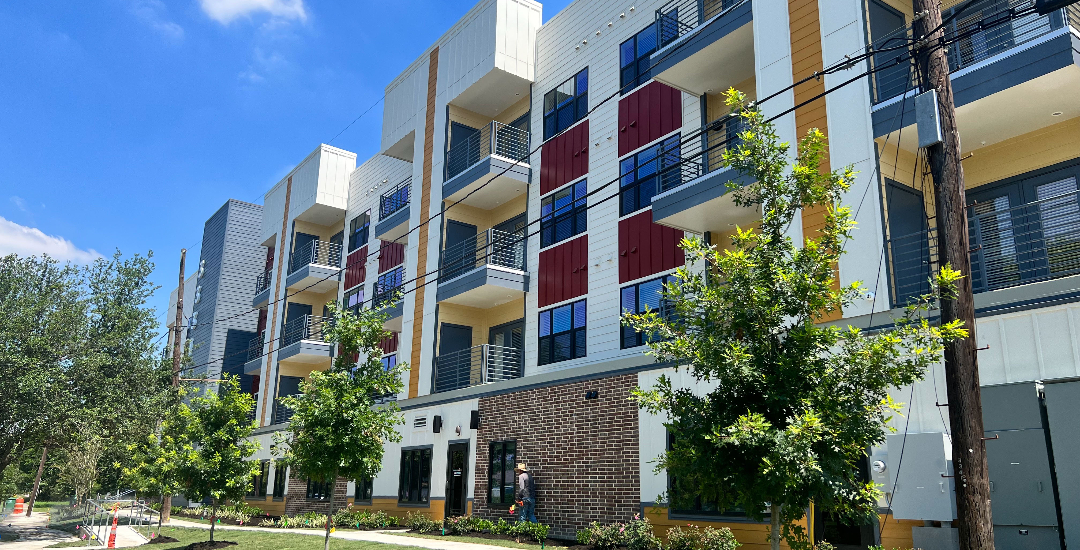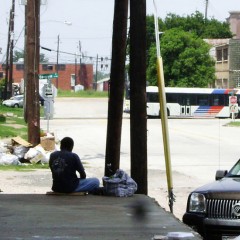The NHP Foundation, headquartered in New York City, has 61 properties and more than 10,000 units of affordable housing in 16 states.
The Citadel on Elgin is responsible for 74 of those units, with 22 of them already pre-leased and about 20 more pending. The project received $10.25 million in federal disaster relief funds administered by the City of Houston’s Department of Housing and Community Development, a 4% Low-Income Housing Tax Credit and tax-exempt bonds.
The Citadel is one of five properties in the NHP Foundation’s Houston portfolio, making it the second-largest concentration of projects in a major city for the organization. Others include Cleme Manor in the Fifth Ward and Pepper Tree Manor in northwest Houston. Tenemos Place in downtown Houston is expected to open later this year. Rosemary’s Place in Midtown broke ground in February and will likely open in early 2024.
The Urban Edge spoke with Eric Price, president of the NHP Foundation, to learn more about the organization’s efforts in Houston.
What is the mission and long-term vision for the NHP Foundation?
To provide as much affordable housing as we can as the markets we’re in is our mission. But on top of the buildings and providing the supply of housing for people of low incomes, we also want to provide resources to the residents once they’re living there. We’re trying to help create a place. Affordable housing, unlike market-rate housing, will stay there for years. Generations of families will sometimes live in our projects. What other amenities can we bring to help make it a place? Those are our two goals — one is developing and building and then providing those resident services on an ongoing basis.
How do you measure the success of an NHP Foundation project?
There’s quantitative success and qualitative success. Quantitatively, we want to have a well-designed, well-built project that we deliver on-time and within budget. That’s one measure of success. Qualitatively, we want to create a place that people want to live in. We want to be responsive to their needs. We have what we call a family-first approach. Rather than just coming to a project and saying, “here are all the services that we provide,” we meet with everybody and ask them about the services they need. Those are going to differ depending on the population you’re serving. In the long-term, it’s about creating a place where individuals or families want to stay and live there.
What goes into the NHP Foundation’s decision-making when looking to expand? How did it come to select the Houston market?
The way we target other states is similar to Houston. There are a couple of factors. The biggest is if there is the political will to provide more affordable housing. What is a city’s will, what are their goals, and how do they plan to use their resources to make it, because any of these projects require multiple subsidies.
The second thing we look at is execution – how difficult is it going to be to execute in that particular market? Let’s say the will is there to do it, they are trying to put resources behind it, but then you have to work at the agency level to make it happen. We need to know that there’s some predictability. Most of these projects take about five years from inception to completion. We can’t be two years into a project and an administration changes, a director leaves and then a city changes everything in terms of what their objectives are.
The last thing is we do a lot of partnerships with local groups when we go into these markets. They know the players and they know the needs. Change Happens is a good example of that. There have been some occasions where we find partners and they pull us into the market and then we find out more. That gets us to be thinking more about the market at large.
How did The Citadel get built in the Third Ward?
It’s been driven by Change Happens, which has been a key to this project. It’s been the Rev. Leslie Smith’s vision for a long time, and just one component of everything he’s trying to do in that neighborhood. He brought us to the table, and we thought he was a good partner. You can feel his tremendous passion. The strongest component is who you’re partnering with. All of our partners here are very strong, very committed organizations that have been around providing services long before we came. You know they’re going to be there to make sure the project is successful moving forward.
In the 2023 Kinder Houston Area Survey released last week, one in five respondents said housing is their biggest concern. What do you make of that considering Houston has been considered one of the more affordable places to live in the U.S.?
I hear the same thing in just about every market we’re in. Quite frankly, I’ve been hearing the same thing for years in many of the markets we’re in, especially in the Northeast. In general, because housing is such a big part of your living cost, and when you have all these other costs going up that kind of exacerbates it even more so. Food costs are going up, gas costs are going up. You have all these other things that are occurring, and then there’s no letdown in your housing costs and it’s such a big portion of your income.
Unfortunately, even though we provide affordable housing, we still live in a market-rate real estate economy. As long as we live in a market-rate economy, no matter how much affordable housing we provide, it’s never going to be enough. At some point, people’s incomes need to be raised to attack this problem. It’s not just a housing creation solution, it’s a job creation solution. We can only do our part in that, but that is really the bigger issue. How do you raise people’s incomes? People should be able to live and work in the same area. They really should. They should be able to have enough income that their housing costs aren’t 50%, 60% or 70% of their income, but that’s a bigger issue.
What are some of the advantages and disadvantages of the Houston market?
Some of the opportunities have been from the lack of zoning. The zoning is a lot more rigorous, and it takes a lot more time and money to get through in other cities. We can spend a year or a year and a half in some markets just trying to get design approval. Houston and Texas have guidelines that need to be followed, but it allows you to get through that process a little quicker. That matters from a cost perspective, an interest rate perspective and a construction cost perspective. One of the disadvantages would be the lack of an income tax and higher property taxes. That impacts the operating cost of a particular project because it’s higher in other markets. It doesn’t make it impossible, it’s just a difference from some of the other markets we’re in.
What can other cities learn from Houston when it comes to housing?
The coordination that takes place in Houston, particularly providing housing for the homeless — they’re probably ahead of most places in terms of that coordination. They’ve done a terrific job over the last decade. The commitment is really across the board on the political level. I think that’s something other places could learn from Houston.



